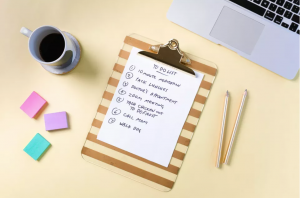Tips on how to cope with seasonal affective disorder
As the seasons change and the weather becomes colder, holiday celebrations come along and so does break! However, seasonal affective disorder, or seasonal depression, also tends to spike during the colder seasons. Here are a few tips on how to cope with seasonal affective disorder if you’re struggling with it.
Write your daily thoughts in a journal
If you’re not a big fan of talking to someone about your feelings everyday and are more inclined towards writing, you should consider writing your thoughts in a journal. Writing in a journal can help you get everything off of your chest without worrying about filtering yourself, just jot down whatever you’re feeling or thinking when you decide to write. It doesn’t have to be neat, pretty, or perfect – it should mainly focus on how you’re feeling throughout the day and whatever pops in your head.
Talk to a parent or trusted adult about how you’re feeling
Although this is a common tip that teenagers are encouraged to do in general, it can prove to be beneficial once you try it. Talking to someone about how you’re feeling is a helpful way to get rid of any pent up feelings and negative energy. Bottling up emotions and holding onto your thoughts may feel like the easiest way to cope without bothering anyone, but this can weigh you down in the long run and hurt you even more. Just remember that your parents and school clinician are always there for you if you need to talk, and no matter what you’re feeling, your emotions are validated.
Avoid consuming/drinking too much sugar and greasy foods
While this is also a good health tip to bear in mind, one way you can help yourself when dealing with seasonal affective disorder is avoiding consuming too much junk food. Eating too many sugary or greasy foods can put on weight, heighten blood sugar levels and not to mention, it can also increase symptoms of anxiety and depression. Your diet may not be the overall factor in what you experience with this disorder, but it does affect your health and also contributes to symptoms. Healthy eating and taking care of yourself physically is always a good first step.
Go for a drive
Note: if you are under 16, have a permit, or don’t have your driver’s license, you must drive with a parent or legal guardian.
Although this isn’t a long-term solution, a good way to clear your head and take a break for a few minutes is going for a drive. Staying inside all day may dampen your mood and you won’t have to worry about getting into traffic or being around too many other cars since roads are less crowded due to the virus and most people working/attending school from home. A short drive can help your day just a little bit because you can blast your music as loud as you want and get away from being stuck inside all day, even if you’re just driving around your neighborhood.
Stick to a routine
If you suffer from seasonal affective disorder, one of the most recommended tips is sticking to a daily routine. Sticking to a routine may sound a bit annoying and repetitive, but it’s a good way to know what you need to do everyday. For example, you can decide what time you want to wake up each day. If you have school, you can choose to wake up earlier so you have more time to get ready and eat breakfast. While, on weekends, you can afford to sleep in a bit (but not too late because you don’t want your schedule to drastically change) before getting on with your day. Sticking to a routine is a helpful way to feel more in control of your schedule, no matter how annoying the repetition may be.
Staying off of social media and technology as much as you can
An extremely beneficial way to cope is staying off of social media and technology as much as you possibly can. Using technology for school and homework is completely understandable, but keep in mind that school usually lasts from six to eight hours throughout the majority of the week and homework can last anywhere from three or more hours, which can ultimately put too much strain on your eyes and mind. Another thing you should practice is also straying away from social media as much as possible. Social media platforms may be easy when it comes to chatting and staying in touch with friends, catching up on recent events, keeping up with the news, or even following what’s going on with your favorite celebrities – but using these platforms for prolonged periods of time can take time away from other important tasks at hand and hurt your mental health. Rather than give up social media or technology cold turkey, create break sessions for yourself. Having a 15 to 20 minute break is a much more balanced way to catch up on some free time while also distancing yourself from spending too much time on technology or social media.
Go for daily walks
Another common health tip that’s encouraged, going for daily walks is a good way to go outside and get some fresh air. Taking a 30 minute walk each day is not only healthy for your body as it’ll help you get some steps and exercise in throughout the day, but studies have also proven that walks help improve a person’s mood. Staying active is crucial, and walking is the one of the best ways to get out of the house and burn some calories. If you’re not a big fan of walks, listening to your favorite songs or podcast should be a good way to distract you!
Talk to your healthcare practitioner and see what their advice is
If you suffer from seasonal affective disorder and feel like you can’t find helpful coping strategies, something you may want to look into is talking to your healthcare practitioner about your struggles. Some people may avoid making an appointment for this problem because they don’t want to be prescribed medication, but keep in mind this is usually doctors last resort. Talking to your healthcare practitioner is a proactive way to gain insight into a professional’s perspective on coping strategies, and it doesn’t hurt to see what they recommend.
Talk with a professional
Sometimes, it takes professional help to get through depression. Small fixes aren’t always enough, so you can get accessible care with services like Better Help or find a local therapist.
Remember, you got this
Dealing with seasonal affective disorder isn’t easy nor fun, especially during times like these. Just remember, you’re incredibly strong and you’re a warrior for fighting this battle. Even if you feel like you’re stuck inside the dark part of the tunnel and you’re not moving forward, there is a light at the end of the tunnel and it takes time to get there. Don’t give up and keep pushing forward.
Adriana is a senior at South Lakes. She’s in Journalism 4, and is the head of Features & Entertainment. She’s part of many clubs...





















